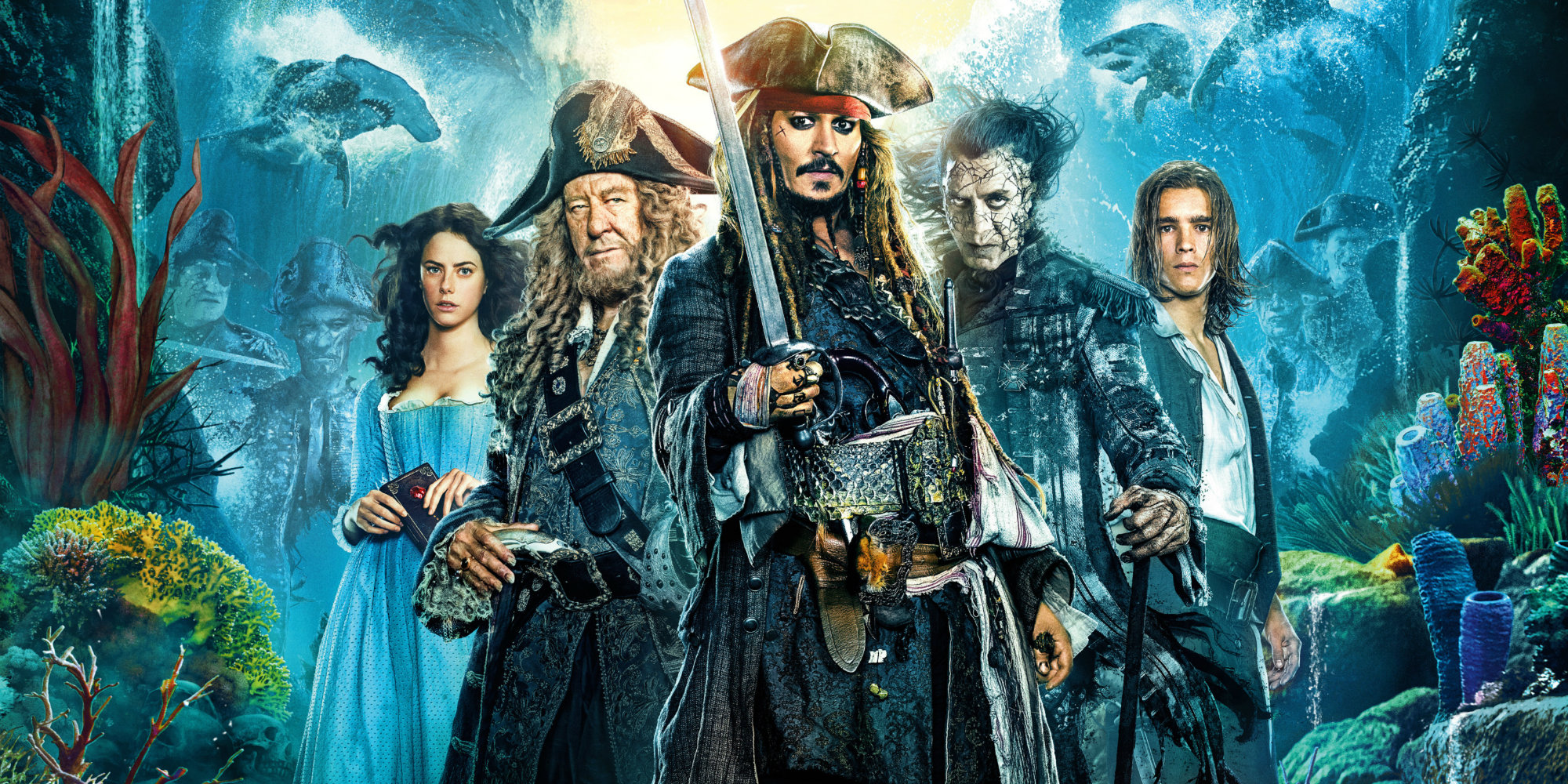There was a time, back during the previous decade, where Disney’s Pirates of the Caribbean franchise stood among the studio’s most beloved and lucrative film properties. After 2003’s original (and excellent!) Pirates of the Caribbean: The Curse of the Black Pearl, which gave birth to Johnny Depp’s iconic pirate hero, Jack Sparrow, Disney has been trying hard as ever to keep chasing the success of that classic adventure movie. They’ve done this previously over the course of three sequels, all of which felt like diminishing returns that just tarnished the legacy of this once beloved franchise ever further. Then, after 2011’s Pirates of the Caribbean: On Stranger Tides, which shed fellow leads, Will Turner and Elizabeth Swann for an entirely Jack Sparrow-focused quest, the franchise’s planned fifth installment ended up in development hell, seemingly taking whatever leftover momentum Pirates of the Caribbean still had with it.
Finally however, Pirates of the Caribbean: Dead Men Tell No Tales (known as ‘Pirates of the Caribbean: Salazar’s Revenge’ in certain international territories), the formerly stalled fifth movie in the Pirates of the Caribbean franchise, has shuffled its way into theatres, once again trying to capitalize on Johnny Depp’s eccentric pirate anti-hero. Even the series’ former lead actors, Orlando Bloom and Keira Knightley, make cameos in this installment, with their progeny serving as a stand-in to their presence with Captain Jack during this latest adventure, with most of this movie still seemingly revolving around Jack once again. Oh, and Barbossa is also still around, since Geoffrey Rush is one of the only other actors in this series that has successfully made appearances in every other installment, so why not keep that going with this new fifth offering?
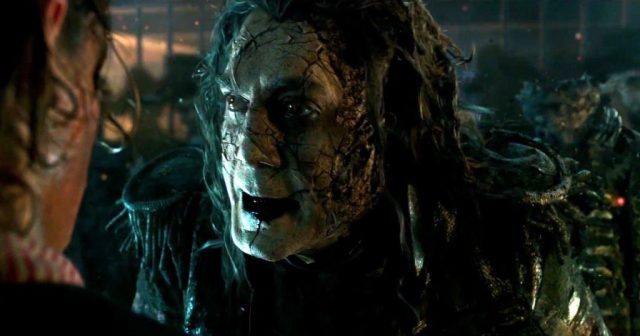
As you can imagine though, Pirates of the Caribbean: Dead Men Tell No Tales, despite feeling like a noticeable improvement over the previous Pirates of the Caribbean: On Stranger Tides, is coming at a time when the Pirates of the Caribbean franchise is starting to feel especially tired, and that definitely bleeds into the final product of this fifth movie. Even Depp’s iconic pirate lead no longer seems to possess the skilled, resourceful edge that Captain Jack once built himself around back during the previous decade, with Jack now stumbling around like a clueless buffoon within a storyline that feels disappointingly sluggish and rehashed. There’s still enough of a sense of fun and charm to make Pirates of the Caribbean: Dead Men Tell No Tales worth watching if you enjoyed the previous movies, or enjoy light-hearted adventure movies in general, but predictably, this overdue fifth installment still fails to fully recapture the magic of this franchise’s first breakout offering.
Johnny Depp is back again as Captain Jack Sparrow, who is once again serving as the central character of this movie, despite an attempt to rebuild the series’ original ensemble foundation with a duo of new leads. Alongside Jack this time is Henry Turner, played by Brenton Thwaites, the son of Will and Elizabeth Turner, who is desperate to reverse the curse upon his father, who is played in a small role once again by Orlando Bloom. This is theoretically done by finding the Trident of Poseidon, which is what brings the various lead characters together. At the same time, a young woman named Carina Smyth, played by Kaya Scodelario, ends up roped along with Jack and Henry, after her personal quest to solve a map left to her by her late father ends up aligning with the journey for the Trident.

The Trident of Poseidon thus serves as the necessary central macguffin of this latest Pirates of the Caribbean movie, and Jack has his own reason for wanting to seek it out, after he becomes targeted by the villain of Pirates of the Caribbean: Dead Men Tell No Tales, Captain Salazar, another undead nemesis of Jack’s that he doubled-crossed and left for dead in his younger years. Javier Bardem portrays Salazar, and Bardem is probably the best actor in the movie, even including Depp, since Bardem is one of the only actors that doesn’t feel either burned out or bored here. Bardem’s seething, scenery-chewing menace calls back to his performance as a highlight Bond villain in 2012’s Skyfall, giving him a twisted, grimacing feel that complements his subdued rage with a genuine sense of murderous glee. Salazar thus ends up being a lot more fun and memorable than Ian McShane’s Blackbeard from the previous Pirates of the Caribbean: On Stranger Tides, even if Bardem’s character still feels like a transparent attempt by Disney to blend the sensibilities of the undead Barbossa from the first movie, and Davy Jones from the second and third movies.
Surprisingly, the other big highlight personality here is Kaya Scodelario, another highlight performer, with Scodelario portraying Carina with an infectious energy and sharp intelligence that makes her a legitimately improved stand-in for the former Elizabeth Swann. This finally gives Scodelario a solid blockbuster turn after the more dull and bland character that she plays in her other well-known blockbuster role, as Teresa in the Maze Runner trilogy. By contrast however, Thwaites is given frustratingly little to work with as Henry Turner, a character that unfortunately ends up taking after his father, namely by being rather boring in contrast to everyone else. Henry is solely defined by basically being a Mary Sue, which makes him an even more milquetoast take on the kind of character that Orlando Bloom originally pioneered in Pirates of the Caribbean: The Curse of the Black Pearl back in 2003!
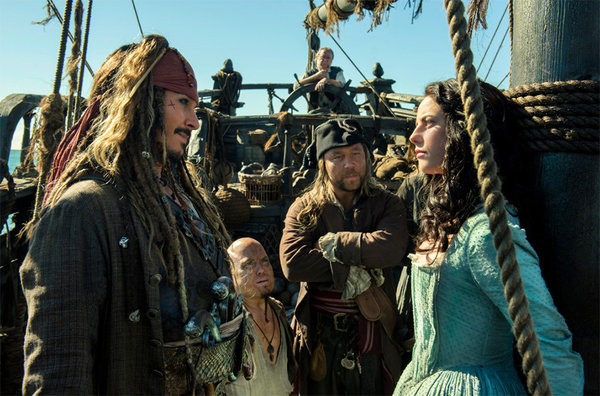
By far the biggest disappointment here though is, unfortunately, Johnny Depp himself, who feels like he’s firmly going through the motions as Jack Sparrow at this point. Jack feels like he’s blatantly past his prime here, simply bumbling through a story that constantly portrays him as a supernaturally lucky idiot who never seems to have an actual plan, which completely misses the point of why Jack was originally so appealing in the first movie especially! Geoffrey Rush feels similarly tired as the returning Barbossa here, especially with how clumsily the movie ends up inserting him into the story, in turn meaning that this movie conveniently forgets some elements from the ending of Pirates of the Caribbean: On Stranger Tides, so that Barbossa can’t just conveniently fix everything for Jack and co. This is quite sad, since Depp and Rush are the two most established names in the Pirates of the Caribbean franchise, but it currently seems like even they don’t care about the franchise anymore, so why should the audience?
Pirates of the Caribbean: Dead Men Tell No Tales magnifies the problem that only occasionally crept into Disney’s otherwise strong live-action remake of Beauty and the Beast from this past March, namely that it feels very intruded on and focused-tested to death. There’s something disappointingly hollow about this latest Pirates of the Caribbean installment, which feels too much like a cynical cash grab, especially with how blatantly it tries to crib together various disparate elements from the series’ first three movies. Rather than construct an organic sequel that effectively builds on what came before, Pirates of the Caribbean: Dead Men Tell No Tales spends far too much time trying to chase past glories, and re-orient the franchise to falsely emulate the story beats of Gore Verbinski’s original trilogy from the previous decade, only without Verbinski’s inspired creative spark to bring it together.
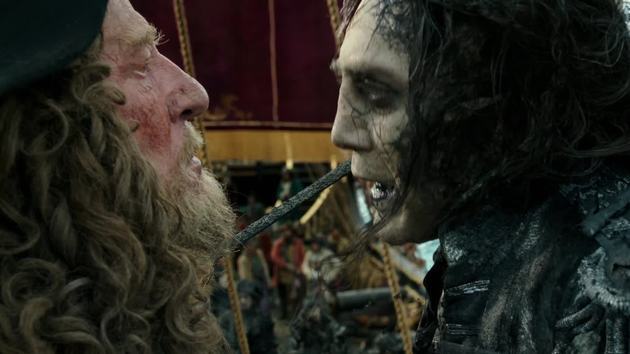
This sense of workmanlike reverse-engineering creates two major problems with the storyline of Pirates of the Caribbean: Dead Men Tell No Tales, which sink the plot in way too many places. The first problem is that this movie completely lacks any real sense of urgency or stakes. The thrills just aren’t here in this latest Pirates of the Caribbean offering, because the obstacle that’s created to work against the heroes just never feels very pressing. A huge chunk of this movie is surprisingly slow-paced as well, with the action never truly feeling like it really gets off the ground. This is all the more true when Pirates of the Caribbean: Dead Men Tell No Tales feels tipped much further in the direction of humour over excitement, with the story constantly getting distracted with irrelevant comedy set pieces that otherwise have no bearing at all on the storyline. This makes the movie feel longer than it is, and that’s even worse when this is actually the shortest movie in the Pirates of the Caribbean series at this point, even though it still clocks in at just over two hours long.
The second and larger issue with the storyline of Pirates of the Caribbean: Dead Men Tell No Tales is that it doesn’t bother to explain how much of its lore and threats work, and just hopes that the audience will blindly accept them at face value. That includes the Trident of Poseidon, which is given no rules whatsoever, and basically works however the script it wants to. The whole reason why Salazar becomes a threat is extremely contrived as well, forcing a legendarily shoehorned retcon into the franchise that just doesn’t make any sense, considering events from the prior movies. On top of that, The Devil’s Triangle, the supposedly cursed place where Salazar and his men went down and became undead, is not given any explanation, nor ever has anything about it firmly established, and thus, Salazar and his crew are, like the Trident of Poseidon, basically doing whatever the script demands, with the only limitation being that they can’t set foot on land. Oh come on, that was clearly ripped from Davy Jones and the Flying Dutchman’s crew!
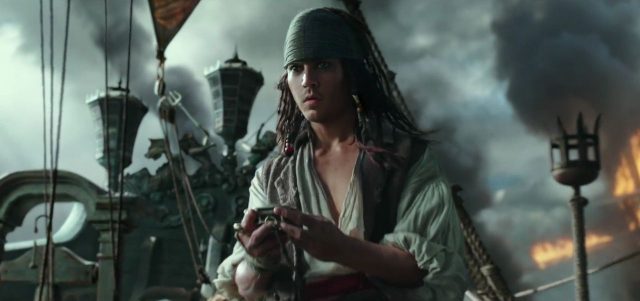
This script really needed a rewrite, since the series didn’t bring back the writing crew from the previous four movies, possibly also explaining why Pirates of the Caribbean: Dead Men Tell No Tales so blatantly misses the point of what’s needed to make a good, or at least acceptable Pirates of the Caribbean movie in terms of its storytelling. Adding insult to injury is that this latest sequel even outright ignores certain things that were clearly established in the previous movies, even sweeping a lot of the previous Pirates of the Caribbean: On Stranger Tides completely under the rug. This amounts to a disappointingly cynically made Pirates of the Caribbean offering, only drawing even more attention to how late to the party this follow-up is.
With Disney still not enlisting Gore Verbinski to come back to directing the franchise he originally turned into the most lucrative live-action Disney film series that doesn’t have either Marvel or LucasFilm branding, the studio has instead changed directors again for this fifth movie. Subbing out Pirates of the Caribbean: On Stranger Tides’ Rob Marshall, Pirates of the Caribbean: Dead Men Tell No Tales brings in the directing duo of Joachim Ronning and Espen Sandberg, two Norwegian directors who are best known for directing some episodes of Netflix’s now-cancelled original series, Marco Polo, and 2006’s EuropaCorp-produced movie, Bandidas. Yes, the directing duo behind Bandidas helms Pirates of the Caribbean: Dead Men Tell No Tales, and yet, they somehow couldn’t get Penelope Cruz back for this sequel? Really?

Well, in any case, Ronning’s and Sandberg’s direction is a little uneven in some places. It’s good enough, since they at least manage to make Pirates of the Caribbean: Dead Men Tell No Tales feel like a recognizable and functional Pirates of the Caribbean movie, but it’s clear that Ronning and Sandberg look at this series as a simple-minded farce, since they don’t take it seriously to a fault. There’s a lot of over-the-top buffoonish scenes with Jack especially, some of which are funny, but many just feel forced and out-of-place. Even the action scenes are almost entirely played for laughs, which never gives them the sense of weight or danger that they truly need. It’s almost like Ronning and Sandberg somehow thought they were directing a cartoon, and didn’t take advantage of the explicitly PG-13 Pirates of the Caribbean franchise’s potential for heightened Disney action at all!
It also doesn’t help that Ronning and Sandberg clearly have a lot of ideas for this newest Pirates of the Caribbean movie, and rather than picking and choosing what should and shouldn’t be there, it feels like they just threw any old idea into the movie, no matter how ridiculous or forced. This is why we have characters that don’t need to be here, joke scenes that don’t need to be here, and other such things that make Pirates of the Caribbean: Dead Men Tell No Tales feel too distracted and sluggish. Even with this being the shortest Pirates of the Caribbean movie yet, its direction really needed to be leaner and more focused to better engage the audience. To give credit where credit is due however, at least Ronning and Sandberg are clearly having fun, which probably explains why Pirates of the Caribbean: Dead Men Tell No Tales is noticeably more entertaining and memorable than most of Pirates of the Caribbean: On Stranger Tides was before it.
Geoff Zanelli composes the score to Pirates of the Caribbean: Dead Men Tell No Tales, doing what he can to inject a heightened sense of fun and engagement into a movie that’s kind of wanting for it at times. Zanelli’s score really plays up the sense of high adventure and swashbuckling fun too, feeling a lot more free and upbeat than many of the Pirates of the Caribbean scores that came beforehand. Even his reprise of the famous Pirates of the Caribbean theme tune is made to be fluffier and sound more fun and comical, again acting as if he’s scoring an animated movie at times, not a live-action movie. While it’s a fun score, it doesn’t manage to capture the epic scale of Verbinski’s trilogy of Pirates of the Caribbean movies in particular, so it doesn’t totally succeed in its efforts to crank up the excitement.

The rest of the audio in the movie also feels noticeably less grim and squeamish, with even the violence, or at least how it’s presented in the audio, feeling like it was slightly toned down in this latest offering. It really feels like this latest Pirates of the Caribbean movie is working hard to almost be the direct opposite of Verbinski’s original trilogy in terms of its tone, which was sometimes surprisingly intense and terrifying even for adults, let alone children, despite Pirates of the Caribbean: Dead Men Tell No Tales ironically also trying very hard to emulate said original trilogy in its writing! Essentially, Pirates of the Caribbean: Dead Men Tell No Tales feels more blatantly like a Disney movie in how its sound design is presented, seemingly trying to put kid gloves on the franchise all of a sudden when we’re five movies in, as so much of the action is played for humour, and so much of the stakes don’t feel all that harrowing.
If there’s one thing that Pirates of the Caribbean still does very well for Disney, it’s the fact that it’s still among one of the most visually stunning live-action blockbuster franchises around. There’s seemingly a bit more cheating in this latest sequel when it comes to the environments, namely with green screens and the like, to try and keep the budget from bloating out of control (even as it still ended up around a staggering $230 million sum!), but at least the movie is still presented really well. As you can imagine, Captain Salazar and his crew are definitely the visual highlights in this movie, having an effectively creepy, ghastly look that still doesn’t fully compare to the horrifying appearance of Barbossa’s undead crew in the original movie, but at least still feels unique and cool. I especially like the effect that has Salazar and his men animate as if they’re always underwater, referencing where they first got cursed in The Devil’s Triangle, which helps them look more unnerving.
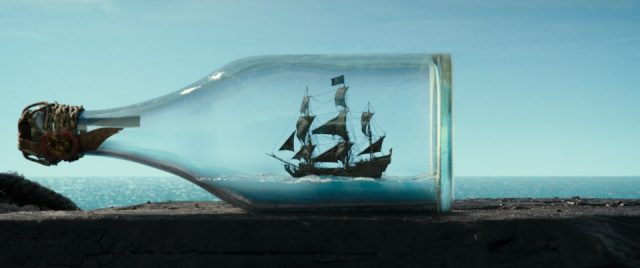
My screening of Pirates of the Caribbean: Dead Men Tell No Tales was also in full IMAX 3D, and I was pleasantly surprised to see that this was overall a pretty sharp way to see the movie! The 3D presentation is at least alright, primarily adding more of a sense of scope to the scenes at sea, along with adding a few atmospheric flourishes when Salazar’s crew is present, but it’s the IMAX elements that I ended up being more impressed with. The movie makes pretty decent use of the IMAX screen, further increasing the scope of the gorgeous voyaging shots on the water, and utilizes the IMAX speakers to bump up the sound a little more, helping to compensate for the fact that this latest Pirates of the Caribbean movie isn’t quite as intense or engaging as its predecessors. The IMAX 3D cut does feel like the ideal way to enjoy Pirates of the Caribbean: Dead Men Tell No Tales in the end, and fortunately, even as this franchise still feels like it’s clearly chasing the lightning it caught in a bottle back in 2003, it at least still impresses all around from a visual standpoint.
Pirates of the Caribbean: Dead Men Tell No Tales is well presented enough, and has enough genuinely enjoyable moments to at least break the series’ chain of progressively worse sequels, even if it still falls well beneath the outstanding standard of the original Pirates of the Caribbean: The Curse of the Black Pearl from 2003. Despite it ultimately being a small improvement over Pirates of the Caribbean: On Stranger Tides however, this movie illustrates more than ever how tired this franchise has become, and it would probably be prudent for Disney to wrap the series up here, and let the Pirates of the Caribbean movies sail into the sunset with a decent amount of dignity. I doubt that will ultimately happen though, despite this movie marketing Pirates of the Caribbean: Dead Men Tell No Tales as the supposed ‘final adventure’, since the studio inevitably gets greedy, and sneaks in a post-credits scene that yet again teases another sequel that no one asked for!
Granted, if you haven’t found yourself soured on the Pirates of the Caribbean franchise at this point, then you’ll probably have a decent amount of fun with Pirates of the Caribbean: Dead Men Tell No Tales, despite its rather obvious flaws. It’s clear however that this franchise is firmly running on fumes now, particularly with Pirates of the Caribbean: Dead Men Tell No Tales suffering a litany of production issues, which led to it showing up way too late to the party, furthering hurting its already apparent script and direction issues. Even Jack Sparrow himself just doesn’t have the same touch anymore, with Johnny Depp’s schtick feeling as old and recycled as many of the story elements throughout this latest Pirates of the Caribbean movie, leading to the obvious question of why Disney is even bothering with more Pirates of the Caribbean movies at this point, beyond the fact that the previous ones made a ton of money.
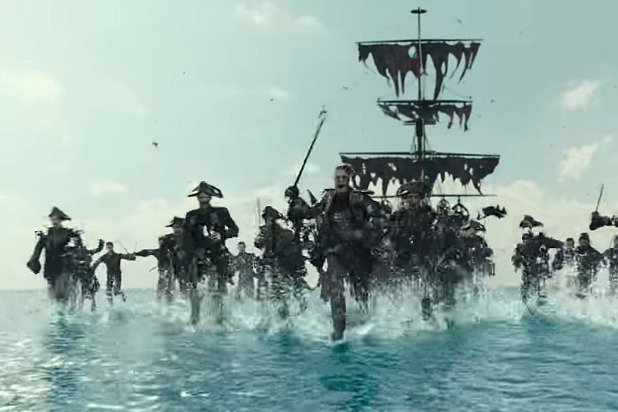
Between the Marvel Cinematic Universe, the Star Wars universe, and particularly Disney’s own in-house slate of live-action remakes planned over the next several years, Disney has more than enough lucrative and successful live-action movie ventures on the go, leaving it unnecessary to keep dragging out Pirates of the Caribbean, even when it’s so clearly past its prime now. The studio just needs to embrace the fitting ending that Pirates of the Caribbean: Dead Men Tell No Tales has, forget about that forced post-credits scene they slipped in there, and let Jack Sparrow and his crew retire while they’re, well, not quite on top, but still technically functional. That’s probably wishful thinking, but when your sequels start coming more from corporate checklists and focus groups than truly inspired ideas, your franchise’s treasure trove has probably been well and truly plundered.

